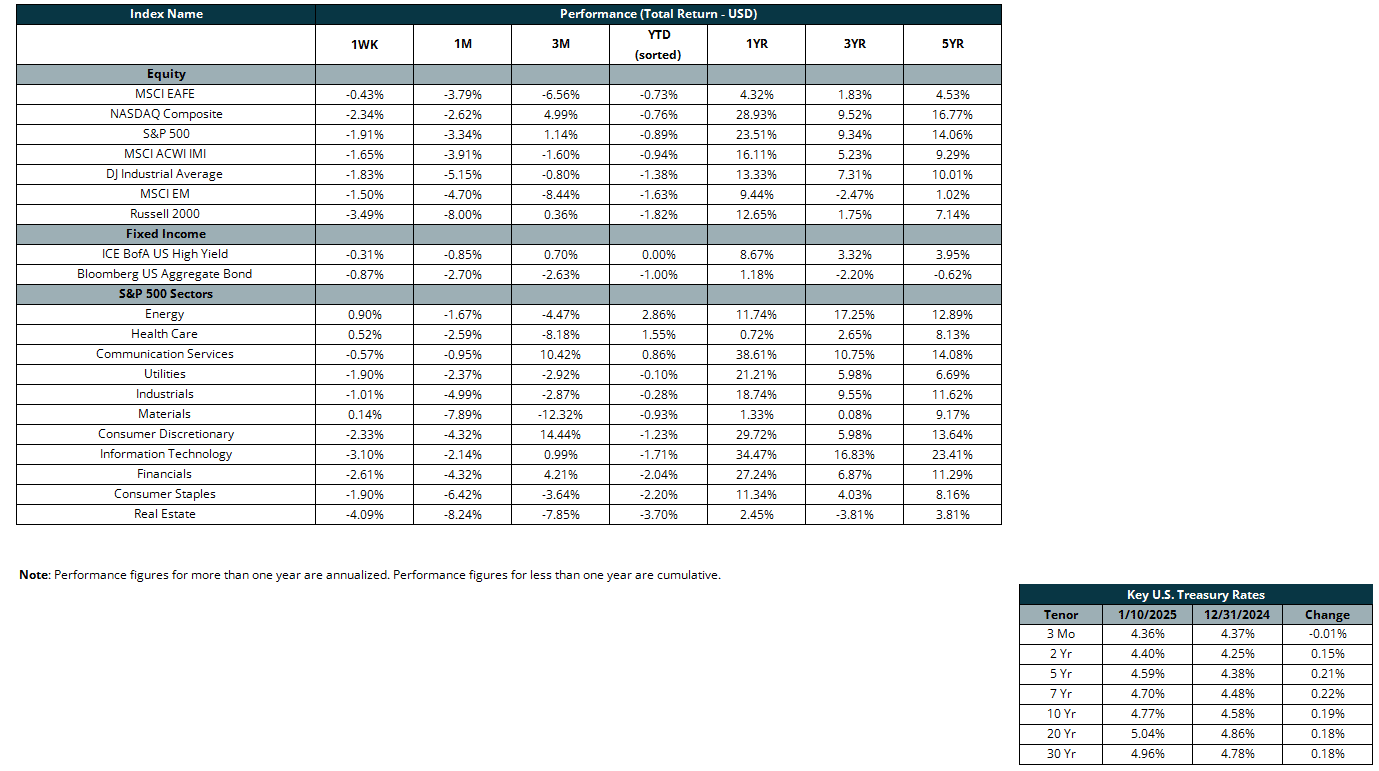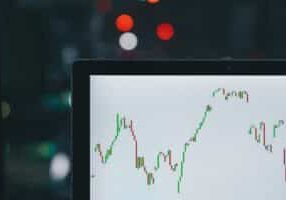Strong Jobs Data Sparks Sell-Off

by Sequoia Financial Group

by Sequoia Financial Group
The U.S. economy’s stronger-than-expected performance, coupled with inflation concerns, drove Treasury yields higher and sparked a market sell-off last week. Rising consumer pessimism and uncertainty around President-elect Trump’s policies, including tariffs, added to investor anxiety.
On Wednesday, the ADP Employment Survey revealed a slowdown in private sector hiring, with employers adding just 122,000 jobs in December, down from 146,000 in November. Annual pay growth eased to 4.6% year-over-year, marking its slowest since July 2021. The report set investor expectations for a more benign labor backdrop, suggesting lower inflationary pressures that could influence near-term monetary policy and long-term interest rate movements ahead of Friday’s December jobs report.[1]
However, on Friday the jobs report revealed nonfarm payrolls were up 256,000 in December, well above expectations of 160,000, following a downwardly revised gain of 212,000 in November. The unemployment rate dropped to 4.1% from 4.2%, marking a strong finish to 2024.[2] The resilient labor market fueled concerns about persistent inflation, suggesting the Federal Reserve might keep interest rates higher for longer than anticipated.[3] The Fed has already signaled it’s likely to reduce interest rates fewer times in 2025. This cautious stance partly reflects the potential impact of tariffs and other policies proposed by President-elect Donald Trump, which could exacerbate inflationary pressures. Prolonged high interest rates to curb inflation could slow economic growth and corporate profits.
All markets sold off sharply on the back of this data, with the S&P 500, Dow Jones Industrial Average, and NASDAQ Composite erasing their year-to-date gains. For the week, the Dow and the NASDAQ both fell about 1.6%.[4] U.S. Treasury yields surged following the release of the employment data, with the 10-year yield nearing 4.8%.[5]
Investors were also hit with data that showed consumers are more pessimistic about future pricing pressures. According to a preliminary reading Friday from the University of Michigan’s Consumer Sentiment Index, year-ahead inflation expectations rose from 2.8% last month to 3.3%, the highest since May 2024. Long-run inflation expectations also increased from 3% in December to 3.3% in January.[6]
Concerns about President-elect Donald Trump’s potential policies, including tariffs and immigration changes, added to market uncertainty. On Monday, the Washington Post reported that Trump would narrow the focus of his tariffs to select goods and services.[7] However, Trump later disputed the report. On Wednesday, sources told CNN that Trump is considering declaring a national economic emergency under the Economic Emergency Powers Act (IEEPA) to implement his broad tariff policies, a key campaign focus. His team is also exploring alternative legal approaches. Reactions to the news included weakened stock futures and a stronger U.S. dollar.[8]
Elsewhere, chipmakers came under pressure in light of new chip export curbs expected to be announced by the Biden Administration. Nvidia (NVDA) fell 3%, while AMD (AMD) fell 4.8%.[9]

[1] https://www.wsj.com/economy/consumers/u-s-consumer-confidence-dips-as-inflation-expectations-spike-09be790d
[2] https://www.bls.gov/news.release/empsit.nr0.htm
[3] https://apnews.com/article/stocks-markets-tariffs-rates-jobs-efc5402f914dd7403a8dc108f96e5bb4
[4] https://www.forbes.com/sites/dereksaul/2025/01/10/stocks-drop-after-jobs-report-shows-hot-us-labor-market-heres-why/
[5] https://www.reuters.com/markets/us/wall-street-fear-gauge-3-week-high-stocks-sink-2025-01-10/?utm
[6] https://www.barrons.com/livecoverage/stock-market-today-011025/card/consumer-sentiment-slips-inflation-expectations-climb-to-highest-since-may-24–QlxGuPLMMUVqJEZh4eGA
[7] https://www.washingtonpost.com/business/2025/01/06/trump-tariff-economy-trade/
[8] https://www.cnn.com/2025/01/08/economy/trump-national-economic-emergency-tariffs/index.html
[9] https://www.barrons.com/articles/nvidia-stock-biden-trump-china-chip-exports-cbd1ee5c
This material is for informational purposes only and is not intended to serve as a substitute for personalized investment advice or as a recommendation or solicitation of any particular security, strategy or investment product. Diversification cannot assure profit or guarantee against loss. There is no guarantee that any investment will achieve its objectives, generate positive returns, or avoid losses. Sequoia Financial Advisors, LLC makes no representations or warranties with respect to the accuracy, reliability, or utility of information obtained from third-parties. Certain assumptions may have been made by these sources in compiling such information, and changes to assumptions may have material impact on the information presented in these materials. Sequoia Financial Advisors, LLC does not provide tax or legal advice.








Fed Chair Powell’s Tariff Talk Spooks Already-Nervous Markets